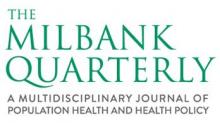Found 71 resources.
0
0
0

Poor maternal and child health (MCH) outcomes and rates of chronic disease are persistently high in the United States and concentrated in rural and service-deprived areas where local health departments provide most care. In a new Milbank Quarterly study, Taryn A. G. Quinlan, Amelia L. Mitchell, and Glen P. Mays of the Colorado School of Public Health use national survey data from 630 local health departments to understand the relationship between social service collaboration and the provision of direct MCH services, such as the Special Supplemental Nutrition Program for Women, Infants, and...
Topics: dual-generation initiative, Early childhood, Health, Low-income, Partnerships, Research
 Shared by Sandra Ware
on Feb 7, 2023
Shared by Sandra Ware
on Feb 7, 2023 1
0
0
The Administration for Community Living’s Aging and Disability Network is a multifaceted service infrastructure for older adults and people with disabilities so they can find housing and obtain services like chore assistance, delivered meals, and transportation. By partnering with this community infrastructure, PHAs can improve voucher utilization and leverage and align resources so older adults, people with disabilities, and people experiencing homelessness —all priority populations for federal housing assistance—can obtain supportive services needed to attain housing stability, optimize...
Topics: Advocacy, Community development, Disabilities, Health, Housing, Partnerships, Research, Seniors, Supportive housing, Sustainability
 Shared by Karina George
on Jun 17, 2022
Shared by Karina George
on Jun 17, 2022 0
0
0
How Housing Programs Can Support the Educational Needs of Children Living in Publicly Supported Homes
Topics: Attendance, Broadband, Child welfare, Early childhood, Health, Housing, Literacy, Low-income, Out-of-school time, Partnerships, Place-based, Research, School-readiness
 Shared by Kelly McElwain
on Nov 7, 2019
Shared by Kelly McElwain
on Nov 7, 2019 0
0
0

Trends in Housing Assistance and Who it Serves
Topics: Community development, Disabilities, Education, Funding, Health, Homelessness, Housing, Legislation & Policy, Low-income, Partnerships, Research, Seniors, Workforce development, Youth
 Shared by Keely Stater
on Sep 10, 2019
Shared by Keely Stater
on Sep 10, 2019 0
0
0
The articles below are part of a special collection commemorating 25 years of the Health Care System Research Network’s (HCSRN's) rigorous research to improve health outcomes and health systems’ performance by leveraging electronic health data. This new collection highlights, among other things, advances in personalized cancer care, the optimal use of AI in health care, and the evolution of common data models, featuring work from Kaiser Permanente, Intermountain Healthcare and others.
Topics: Data sharing, Health, Partnerships, Research
 Shared by Housing Is
on Jun 13, 2019
Shared by Housing Is
on Jun 13, 2019 0
0
0
In 2011, Cleveland had one of the highest rates of childhood lead poisoning in the United States, with almost one of every five children in the city receiving this diagnosis. Childhood asthma rates were also extremely high, especially for children living in poverty, according to 2008 statewide statistics for Ohio. Follow along in this new case study with the Engaging the Community in New Approaches to Healthy Housing (ECNAHH) initiative, part the BUILD Health Challenge’s first cohort, as they worked to reduce the occurrence of asthma, chronic obstructive pulmonary disease (COPD), and lead...
Topics: Health, Midwest, Partnerships, Research
 Shared by Housing Is
on Jun 13, 2019
Shared by Housing Is
on Jun 13, 2019 0
0
0

With ever-growing interest in the intersection between housing and health, researchers are evaluating the impact of cross-sector interventions. This session will bring together researchers to share insights from their work relevant to practitioners and policymakers.
Topics: CLPHA, Health, Homelessness, Housing, Low-income, Partnerships, Research, Seniors
 Shared by Housing Is
on May 24, 2019
Shared by Housing Is
on May 24, 2019 0
0
0

Recent research shows that place matters in economic mobility. Strong neighborhoods and community resources can have long-term impact on educational achievements and earnings. Building off of this research, David Williams from Opportunity Insights will discuss how PHAs are collaborating with researchers to develop and evaluate effective interventions for families with young children.
Topics: CLPHA, Mobility, Partnerships, Place-based, Research
 Shared by Housing Is
on May 24, 2019
Shared by Housing Is
on May 24, 2019 0
0
0

A landmark National Academies of Sciences report commissioned by Congress concludes that childhood poverty in the U.S. could be cut in half within a decade with appropriate action. The report culls through the existing evidence-base to identify the most impactful existing policies including the Earned Income Tax Credit (EITC) and housing assistance. This panel will also discuss promising new policies that if enacted could help reduce poverty such as the child allowance.
Topics: Child welfare, CLPHA, Housing, Legislation & Policy, Low-income, Partnerships, Research
 Shared by Housing Is
on May 24, 2019
Shared by Housing Is
on May 24, 2019 0
0
0
This report highlights the development and implementation of a mentoring program for college students in foster care in New York City through a strategic partnership that was forged among New York City’s Administration for Children’s Services, Goldman Sachs and Casey Family Programs. The program is designed to expose youth to professional and experiential opportunities through a series of one-on-one meetings and group workshops. Students have the opportunity to become familiar with the Goldman Sachs corporate environment, understand various business sectors and explore the roles and...
Topics: Child welfare, Foster care, Partnerships, Research, Workforce development, Youth
 Shared by Housing Is
on May 21, 2019
Shared by Housing Is
on May 21, 2019 0
0
0
This environmental scan, conducted by AcademyHealth with support from the Kresge Foundation, provides an overview of the technology behind emerging multi-sector initiatives to address social determinants of health.
Topics: Community development, Data sharing, Health, Partnerships, Research
 Shared by Housing Is
on May 2, 2019
Shared by Housing Is
on May 2, 2019 0
0
0
Over the past several years, a dizzying array of new technology platforms have emerged with the shared aim of enabling health care organizations to more easily identify and refer patients to social service organizations. This guide was developed to help safety net health care organizations understand the landscape of these community resource referral platforms and learn from early adopters’ experiences using them.
Topics: Health, Partnerships, Research
 Shared by Housing Is
on May 2, 2019
Shared by Housing Is
on May 2, 2019 0
0
0
The role of public and nonprofit hospitals and hospital systems in supportive housing is not an obvious one at first glance. Traditionally, the role of nonprofit and public hospitals has been to provide primary healthcare and additional health services to the public, often to select “catchment” areas or neighborhoods. The extent of these institutions’ role in housing was limited to either providing a) short-term inpatient beds for medical or treatment services, or b) residences for nurses or other hospital staff. Why then are more and more nonprofit and public hospitals becoming involved in...
Topics: Health, Homelessness, Housing, Partnerships, Research, Supportive housing
 Shared by Housing Is
on Apr 17, 2019
Shared by Housing Is
on Apr 17, 2019 0
0
0
The PHNCI Innovation Learning Community grantees spent eighteen months hard at work implementing innovations in their communities. From this community, we have been able to learn what makes an innovation work and be replicable, including leadership buy-in, cross-sector partnerships, and community engagement. In addition to learning about innovation broadly from these grantees, we also want to highlight each grantee’s individual work, including success, challenges, and lessons learned for others who may be interested in replicating their work. The case studies below, produced by NORC at the...
Topics: Data sharing, Health, Partnerships, Research
 Shared by Housing Is
on Apr 8, 2019
Shared by Housing Is
on Apr 8, 2019 0
0
0
While the program has changed very little since its inception, the need for the program has increased. In 1975, the number of program grantees stood at 594. Today, the number of grantees stands at 1,268 as more communities qualify to receive direct program allocations. Based on a CDBG Needs Survey conducted by the CDBG Coalition (and discussed later in this report), CDBG grantees have delayed and canceled projects and reduced or permanently eliminated programs because of a lack of CDBG funds. CDBG is an important investment tool for communities and neighborhoods, but program funding must...
Topics: Community development, Funding, Health, Homelessness, Housing, Legislation & Policy, Low-income, Partnerships, Research, Safety, Seniors
 Shared by Housing Is
on Apr 8, 2019
Shared by Housing Is
on Apr 8, 2019 0
0
0
The Keeping Families Together model turned the usual paradigm for prioritizing affordable housing on its head. Rather than targeting the most “stable” families, Keeping Families Together sought out families with the most complicated cases—those at greatest risk. Thanks to this approach, families once on the brink of crisis now have a permanent place to call home, as well as the services and support they need to stay together.
Topics: Child welfare, Family engagement, Homelessness, Housing, Low-income, Partnerships, Research, Supportive housing
 Shared by Housing Is
on Apr 4, 2019
Shared by Housing Is
on Apr 4, 2019 0
0
0
Federal safety net programs are intended to protect the most vulnerable Americans—such as the elderly, people with severe disabilities and young children. Housing assistance plays a critical role in the safety net, providing decent, safe, and affordable housing for millions of extremely low-income and vulnerable families—though, because it is not an entitlement like other federal safety net programs, the assistance available falls far short of the need. Housing subsidies free families to spend on other essentials like healthy food, education, and health care.
Topics: Asset building, Dual-generation, Education, Housing, Mental health, Mobility, Partnerships, Research, Workforce development
 Shared by Housing Is
on Apr 2, 2019
Shared by Housing Is
on Apr 2, 2019 0
0
0

Launched in 2016, the Denver Supportive Housing SIB aims to support residents struggling with homelessness, substance use, and mental health problems by increasing the number of people getting and staying housed and reducing the number of days they spend in jail. The permanent supportive housing model combines a permanent housing subsidy with wraparound services, such as mental health counseling, to help people improve their stability. In Denver, MHCD and the Colorado Coalition for the Homeless (CCH) were selected to offer these services as part of the SIB.
Topics: Cost effectiveness, Criminal justice, Homelessness, Housing, Low-income, Pacific Northwest, Partnerships, Research, Substance abuse
0
0
0
With different drivers but a shared set of goals, public health, health care, social services, and other sectors can come together to work upstream and develop creative solutions to solve the complex problems facing communities today. To that end, with funding from the Robert Wood Johnson, the Public Health National Center for Innovations and the Center for Sharing Public Health Services partnered to launch the Cross-sector Innovation Initiative (CSII). The goal of the CSII is to support, promote and disseminate learning about the role of governmental public health departments in aligning...
Topics: Data sharing, Health, Partnerships, Research
 Shared by Housing Is
on Mar 19, 2019
Shared by Housing Is
on Mar 19, 2019 0
0
0
On behalf of All In: Data for Community Health, Data Across Sectors for Health (DASH) is conducting The 2019 National Inventory of Data Sharing Collaborations for Health to better understand the location and nature of multi-sector collaborations in the United States, their capacity for data-sharing to improve health, and to assess progress in this field among multi-sector collaborations. Your participation in The National Inventory will also help us identify areas for further learning and opportunities to support and expand these activities. All In: Data for Community Health is a learning...
Topics: Data sharing, Health, Partnerships, Research
 Shared by Housing Is
on Mar 13, 2019
Shared by Housing Is
on Mar 13, 2019 0
0
0
A Summary of Results from the MIHOPE and MIHOPE-STRONG Start Studies of Evidence-Based Home Visiting
A healthy birth and positive experiences in early childhood can promote health and development. One approach that has improved outcomes for children and their parents is home visiting, which provides individually tailored support, resources, and information to expectant parents and families with young children. This brief summarizes recently published reports from two national studies of evidence-based early childhood home visiting: the Mother and Infant Home Visiting Program Evaluation (MIHOPE) and MIHOPE-Strong Start.
Topics: Child welfare, Dual-generation, Early childhood, Home visiting, Metrics, Partnerships, Place-based, Preventative care, Research
0
1
1

At a recent public meeting, Sandra Lee Fewer, a member of the city’s Board of Supervisors, asked acting librarian Michael Lambert to explore whether future library renovations might include affordable housing. Fewer hopes to leverage existing public land to create multi-story facilities that include both libraries and housing.
Topics: Community development, Homelessness, Housing, Literacy, Low-income, Partnerships, Place-based, Research, Youth
 Shared by Housing Is
on Jan 29, 2019
Shared by Housing Is
on Jan 29, 2019 0
0
0
Health care in the United States is long overdue for an upheaval. The mismatch between costs, by far the highest in the world, and health outcomes, among the worst in the high-income world, has long been glaring. Perhaps the good news is that the time for such an upheaval has come. At least 4 forces have been gathering steam, each promising to change the nature of health care and, in so doing, influence population health.
Topics: Health, Partnerships, Research
0
0
0
Today, health care providers’ complaints about legal obstacles to health information exchange (HIE) may be better understood as reflecting concerns about the economic and competitive risks of information sharing.
Topics: Data sharing, Health, Partnerships, Research
0
0
0
This article shows how a complex systems perspective may be used to analyze the commercial determinants of noncommunicable diseases (NCDs), and it explains how this can help with (1) conceptualizing the problem of NCDs and (2) developing effective policy interventions.
Topics: Health, Partnerships, Research, Safety

